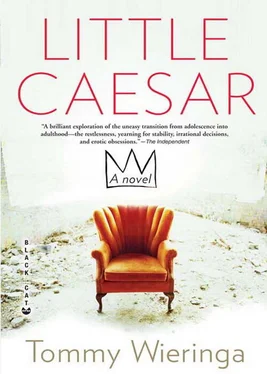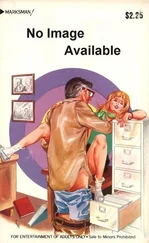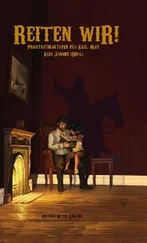‘It’s just a forecast,’ she said.
‘Dream on.’
‘We do have to be prepared,’ she admitted, ‘you’re right.’
We talked about the end, my mother and I. It was our best conversation in a long while. We were not melancholy or dramatic, those were moods that had gone before; in the cold light of the fait accompli, the evacuation and the loss seemed easier to bear.
‘And afterwards?’ I asked.
‘When this is gone, you mean?’
She nodded at the window, outside which the chasm had approached to within a single bound.
‘There has to be something then,’ I said.
‘I have faith that something will come along.’
Faith was her secret charm, the abracadabra of holistic magic. For a moment there was the wrenching feeling of irritation, but I let it pass. She said, ‘I can always get work cleaning houses, or. .’
‘Or at a roadside garage, then we’ll be white trash and we can live in a mobile home along the highway! And we’ll drive around in a van full of junk and neglect our teeth, okay?’
She laughed. The tinkling sound of ice cubes in a glass.
‘So, the day after tomorrow.’
She nodded and said, still in the doorway, ‘We have to be strong, okay, sweetheart?’
‘Strong. .’
‘You already are, you always have been. I don’t know anyone else like you, Ludwig. In fact, you don’t really need anyone anymore.’
Gently, I pushed the door closed behind her.
Sometimes the final notes of a song will go nagging on in my mind. For hours, until a new melody arrives to replace the old one. The same happens to me sometimes with the final words before a silence. They nestle in my head and echo there for a long time. A mysterious, internal repetition. That evening it was my mother’s voice. In fact, you don’t really need anyone anymore . Later, as I was playing the piano as well: In fact, you don’t really need anyone anymore . It summoned up an entire world view. The crowning element in personal development was to not need anyone, to be alone, a mote in the darkness. The final consequence of this view of life, of course, was that she didn’t need me either, anymore.
On my way home I noticed that the wind had picked up. The foam on the surf glowed in the moonlight. The waves were already washing up against the sea wall, but still lacked the force to do it any harm. But it would swell, gather momentum, bubbling and hissing, to strike at our Achilles’ heel. I would sleep poorly in my bed beside the chasm.
Movers arrived. She pointed out the things to them. That needs to go with, that one doesn’t, careful with that lamp, you’re going to dent the copper if you do that. I remembered the house on the Rue Mahmoud Abou El Ela, the faded negatives of cupboards and tapestries on its walls after the dismemberment, and felt the brief stab of loss when I thought about the treasure buried in the Eden of roses, bougainvillea and blue-blossoming jacaranda.
There were three of them. The driver was the boss. He shook his head as he worked.
‘I can have them bring a bigger lorry,’ he said a few times.
They wound their way amid the ten thousand things, an elephant ballet. Outside the wind mocked our efforts. The mover drove back and forth twice between our house and Warren and Catherine’s shed, where we could store our things until further notice. A double row of moving boxes was piled up against the back wall, full of objects swaddled in soft tissue paper, starting in on their period of waiting in the dark.
*
The walls shuddered. So close, you could see the waves from the window. The gray masses of water being pressed up along the cliff and shooting three, four meters in the air, to the top of the roof, where they seemed to pause for one brief, ghastly moment in order to eye us, their prey, before collapsing back into the sea. The end game. The whirlwind of snippets in my head, the age-old questions: where are we going to live? Who will take care of us? An all-embracing what now? But I also knew I would be disappointed if it didn’t happen now — I was tired of dawdling, of pacing the waiting room until the doctor returned with the verdict. Downstairs I heard the vacuum cleaner, my mother trying to undo at least a little of the ravages the movers had left behind. The state in which she left the house behind, I realized, would determine her memories of it. The arrangement and cleansing of that which is doomed to perish is a crucial act, a paradoxical expression of how to live.
A premature brand of disaster tourism had begun. Heads popped up from behind the bushes to observe our evacuation. It was impossible for them to get any closer to the house without standing right at the window, so they watched from a distance, sometimes with binoculars. We were the house that wouldn’t last long now , we were the sea reclaims its own and we were also, as the headline in the Norwich Evening News put it: CASTRUM’S LAST HEROES. One caption read that this, it was rumored, was the house where former porno star Eve LeSage lived with her son. By the time the Sun latched onto the juicy story — SEX GODDESS LOSES HEARTH AND HOME — we were no longer available for comment; they had to use old pictures along with their story, my mother on her back with Wills Horn on top. A team picture from the year our second XV won the championship. In it, I am kneeling at the front, my arms resting on one knee. A circle has been drawn around my head. Selwyn is standing behind me, his arms crossed, beside him you see Leland wearing his scrumcap. Bailey and Dalrymple have just burst out laughing — it’s a cheerful photograph. I had no idea who had been accommodating enough to pass it along to the paper.
In the same way my mother did her vacuuming, so I performed my duties that evening in the Whaler. I played as though the sand were not being washed away from beneath our house at that very moment, I sang as though no block of basalt lay on my heart.
‘It’s gonna happen now, isn’t it?’ Leland said when I took a little pause between sets.
There was no stopping Miss Julie Henry. Her empathy went beyond the bounds of decency; I could picture her deflowering me in the walk-in cooler. Leland asked where I was going to sleep. First at Warren and Catherine’s, I said, we would spend the night there, after that we weren’t sure.
The hotel was busy, a crowd had been drawn by the spectacle of the storm, the waves shooting up meters above the jetties. I took off earlier than usual and ran to Kings Ness. The tempest had now thickened to more substantial stuff, I had difficulty making headway. Torrents of rain. Salty globs of foam were being blown across the land, grains of sand and grass and leaves lashed me about the ears. The sky was open and clear. Over there the dark contours of the house. I stormed into Warren and Catherine’s. The three of them were sitting around the lamp.
‘It’s still there!’ I shouted.
As though something had fallen to the floor and shattered.
‘Take your shoes off,’ Catherine said.
I slid up to the table.
‘Your shoes!’ Warren said.
I went back to the dark vestibule and kicked them off. A glass was waiting for me, the windows rattled in their frames. The substance in my glass was pungent and brought tears to my eyes — I had learned to drink beer in rugby canteens, but whisky was new to me. A hard and unrelenting master. I couldn’t quite get a hold on the mood around the table, I was locked out of the circle.
‘We’ve been talking about it, Ludwig,’ my mother said. ‘Warren and Catherine have offered to let you stay here for a while until things are a bit clearer.’
I didn’t say a word. I waited.
‘I’m leaving for London early tomorrow morning,’ she went on. ‘I don’t know exactly how it will work out, I want to talk to some other lawyers. Warren agrees that this is a case that might go all the way to the European Court of Justice. Because it’s about — a kind of protection. How did it go again, Warren? The right to defend your home? A basic human right, that’s what you said, wasn’t it?’
Читать дальше












